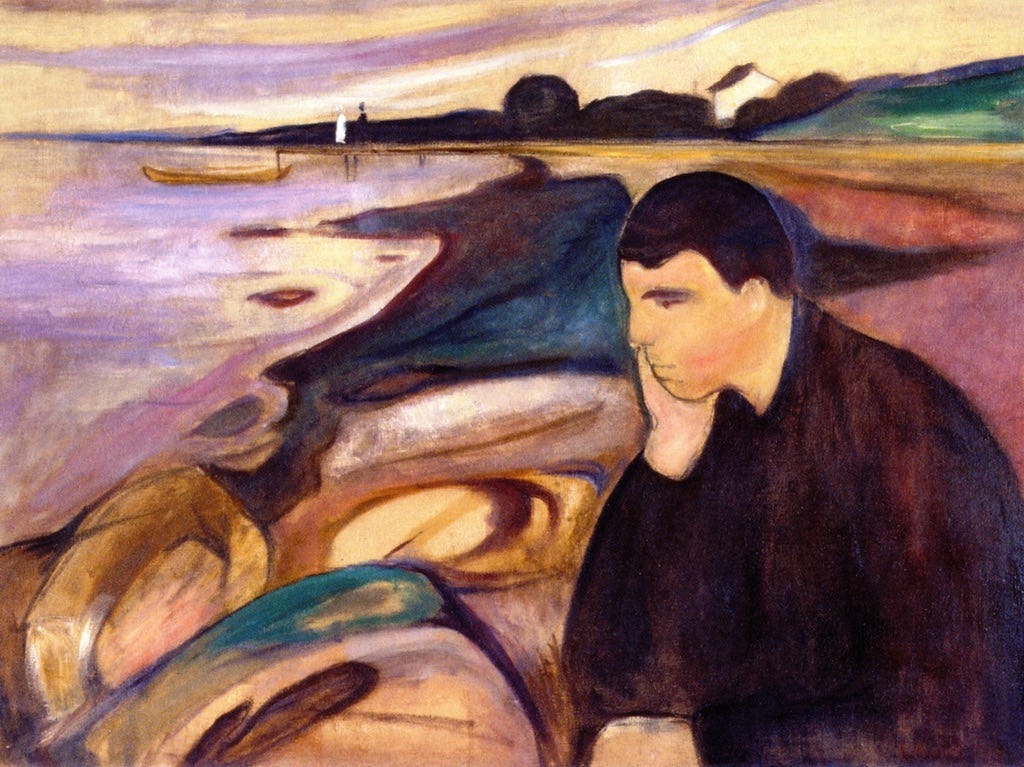Melancholy
“Do you think I’ll be happy someday?” he asked.
I looked at him. He wasn’t looking at me. I thought of lying, but I didn’t.
“No,” I said.
We didn’t say anything more to each other that day, and I didn’t see Matthew again until September. I discovered, however, that he had infected me with a sympathetic melancholy that lasted well into the summer.Little Follies, “The Fox and the Clam”
Melancholy, the subject of our present discourse, is either in disposition or in habit. In disposition, is that transitory Melancholy which goes and comes upon every small occasion of sorrow, need, sickness, trouble, fear, grief, passion, or perturbation of the mind, any manner of care, discontent, or thought, which causes anguish, dulness, heaviness and vexation of spirit, any ways opposite to pleasure, mirth, joy, delight, causing forwardness in us, or a dislike. In which equivocal and improper sense, we call him melancholy, that is dull, sad, sour, lumpish, ill-disposed, solitary, any way moved, or displeased. And from these melancholy dispositions no man living is free, no Stoic, none so wise, none so happy, none so patient, so generous, so godly, so divine, that can vindicate himself; so well-composed, but more or less, some time or other, he feels the smart of it. Melancholy in this sense is the character of Mortality. ... This Melancholy of which we are to treat, is a habit, a serious ailment, a settled humour, as Aurelianus and others call it, not errant, but fixed: and as it was long increasing, so, now being (pleasant or painful) grown to a habit, it will hardly be removed.
Robert Burton, The Anatomy of Melancholy, What it is: With all the Kinds, Causes, Symptomes, Prognostickes, and Several Cures of it. In Three Maine Partitions with their several Sections, Members, and Subsections. Philosophically, Medicinally, Historically, Opened and Cut Up (first published in 1621; reissued in revised editions in 1624, 1628, 1632, 1638, and 1651)
Note to self: Melancholy must be a topic in the Topical Autobiography of Mark Dorset. Be sure to explore—and attempt to explain—the tendency to intensify and extend a period of melancholy. Use analogy to “worrying” an aching tooth or “pouring salt into a wound.” However, be careful not to make too much of this, lest you seem to be complaining or—worse—angling for sympathy—or worse still—trying to seem “interesting” or “deep.” You do not want to become annoying, like Mr. Ramsay:
She heard [Mr. Ramsay]. He said the most melancholy things, but she noticed that directly he had said them he always seemed more cheerful than usual. All this phrase-making was a game, she thought, for if she had said half what he said, she would have blown her brains out by now.
It annoyed her, this phrase-making, and she said to him, in a matter-of-fact way, that it was a perfectly lovely evening, and what was he groaning about, …
He was not complaining, he said.
[more to come on Thursday, October 21, 2021]
Have you missed an episode or two or several?
You can catch up by visiting the archive or consulting the index to the Topical Guide.
You can listen to the episodes on the Personal History podcast. Begin at the beginning or scroll through the episodes to find what you’ve missed.
At Apple Books you can download free eBooks of “My Mother Takes a Tumble,” “Do Clams Bite?,” “Life on the Bolotomy,” and “The Static of the Spheres,” the first four novellas in Little Follies.
You’ll find an overview of the entire work in An Introduction to The Personal History, Adventures, Experiences & Observations of Peter Leroy. It’s a pdf document.



